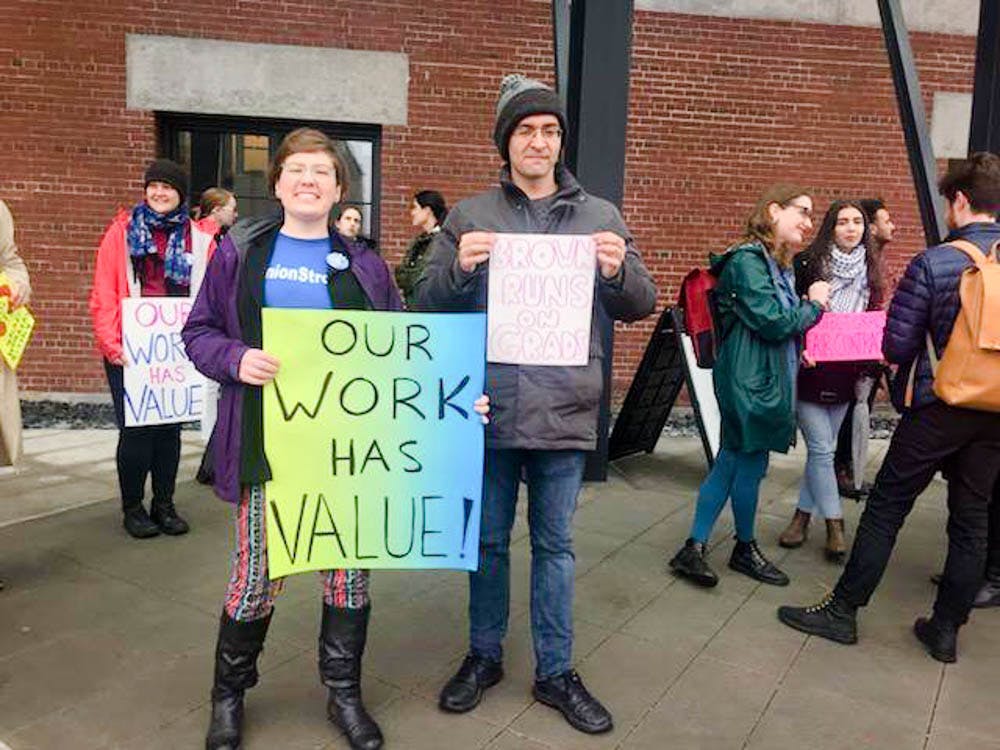The National Labor Relations Board released a proposed rule Friday that would exclude graduate students from classification as employees of their universities, putting the future of the Brown’s graduate student union in question.
The University will have “no further obligations to the union” if the rule takes force before the University and the union, known as Stand Up for Graduate Student Employees, reach a collective bargaining agreement, according to a pre-election agreement signed in June 2018 by the University, SUGSE, and the American Federation of Teachers, SUGSE’s union affiliate.
The University has not explicitly committed to continuing negotiations with SUGSE if the rule goes into place before the parties have reached a collective bargaining agreement.“As the proposed rules are finalized, Brown will review them in detail and assess their potential impact on our campus. Given our collective progress to date, we expect to simultaneously continue to negotiate with the Union in good faith,” Director of News and Editorial Development Brian Clark wrote in an email to The Herald when asked whether the University would continue to bargain with SUGSE without an official mandate.
On Saturday, SUGSE tweeted a series of updates, which read, in part, “we believe the University will honor its commitment to negotiate in good faith.”
Rithika Ramamurthy GS, one of SUGSE’s bargaining committee co-chairs, said the NLRB’s proposed rule reflects a national “anti-worker sentiment” that she worries will create a more difficult environment for SUGSE. “Rule or not, the fair, correct and politically sound thing to do would be to continue bargaining with us,” she added.
If the proposed NLRB rule goes into effect and the University decides to forgo negotiations with SUGSE, graduate students would lose their ability to bargain through a union for health care coverage and improved wages, among other areas of concern. Brown graduate students voted to unionize in November 2018 and in April 2019, kicked off negotiations toward a collective bargaining agreement, The Herald previously reported. Last week, SUGSE and the University reached a tentative agreement on grievance procedures.
“It was a big deal, because to us it signified that the University is still sitting at the table and working toward a contract,” Ramamurthy said. “The compromise was definitely heartening on this tentative agreement.”
Following the rule’s proposal, SUGSE posted a “Toolkit to Oppose NLRB Rulemaking” on its social media, which includes instructions on defending their right to unionize.
If the rule goes into effect, it would apply only to private universities, as unionization at public universities is subject to state law. Students at Rutgers University and City University of New York, for instance, have been unionized for decades. Only five private institutions have active graduate union contracts.
The rule, if passed, would mark the fourth time the NLRB has flipped its position on the issue since 2000, when it first ruled that graduate students had the right to unionize. The president appoints members of the NLRB on a rolling basis, with each member serving a five-year term. This process has created a board that tends to change its leanings based on the political orientation of the nation’s highest office. The NLRB will take comments on the proposed rule from the public for at least 60 days from Monday, Sept. 23. It must reply to all comments before the rule can be instituted.
Ramamurthy hopes the University community sticks up for its graduate students, who touch many aspects of University life. “We make up a really important part of this campus and this community. It would be really disappointing not to feel that support,” Ramamurthy said.





